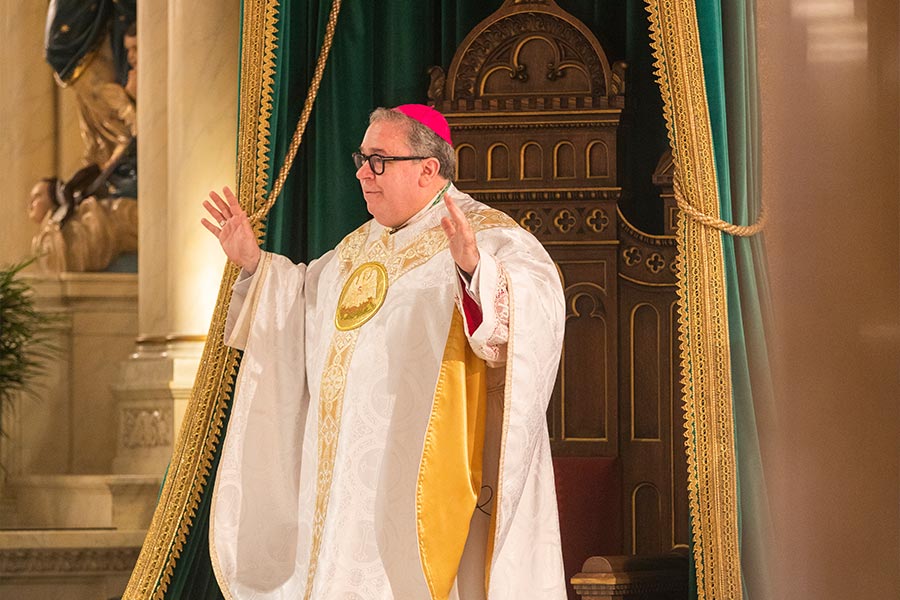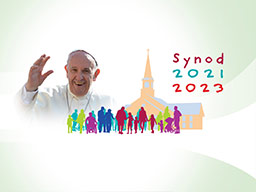Bishop Olson celebrates Mass marking launch of diocesan synodal process

Bishop Michael Olson, shown here at the March 30 Chrism Mass, launched the diocesan phase of the 2023 Synod of Bishops at a Mass at St. Patrick Cathedral on October 17. (NTC/Rodger Mallison)
FORT WORTH — During an October 17 Mass in St. Patrick Cathedral, Bishop Michael Olson asked North Texas Catholics to pray for guidance and wisdom from the Holy Spirit as the diocese begins its participation in a two-year synodal process leading up to the 2023 Synod of Bishops in Rome.
Challenged by Pope Francis to “listen to the questions, concerns, and hopes of every church, people, and nation,” the Diocese of Fort Worth joins other dioceses around in the world in the first stage of the process which focuses on listening and consulting with the People of God. At the request of the pontiff, bishops worldwide celebrated Mass Oct. 17 to launch the process of diocesan consultation.
“By offering this Mass with you, and other dioceses as well, we begin our part in what Pope Francis has called the synodal process — a period of preparation for when the Synod of Bishops meets in two years,” Bishop Olson said, welcoming the congregation. “We pray for the Holy Spirit’s guidance for all the bishops but also for our part in this process of preparation.”
More information about direct participation will come in the following weeks, he assured.
Vicar General Father Jonathan Wallis and Paola Quintero-Araujo, director of the St. Junipero Serra Institute, will serve as co-contacts for the synodal process in the diocese. By mid-November they will name a representative team of people who will develop questions used during the consultative listening sessions.
An open online survey/questionnaire will become available in early 2022 and shared via the diocesan website, email blasts, and parish announcements.
The Vatican hopes for the widest, most diverse participation possible and “we will certainly do our best to make this happen at our local level,” Fr. Wallis said. “We will all have the opportunity to meet each other as created by the Father, redeemed by Christ, and led by the Holy Spirit.”
The pre-synod diocesan phase continues until April 2022 and is followed by continental and universal levels. The theme for the three-part process is: For a Synodal Church: Communion, Participation and Mission.
The word “synod” is of Greek origin and means “meeting of people,” Bishop Olson explained in his homily. After the Second Vatican Council in 1965, St. Pope Paul VI established the Synod of Bishops — a permanent structure with regular meetings that offers advice and recommendations on given topics suggested by the Holy Father. Priestly formation, evangelization in the world, and marriage and family life are some of the issues tackled by bishops in previous synods.

The upcoming synod isn’t a referendum on the Sacred Scriptures, Apostolic Tradition, or the Catechism of the Catholic Church, Bishop Olson stressed. Gospel truths and Church doctrine cannot by changed by the vote of any Church group, he emphasized.
Rather, the synodal process “is an invitation and opportunity to consider the many ways in which all the baptized are responsible for fulfilling the great commission to proclaim the Gospel to the ends of the earth and to the end of days for the salvation of the world,” he emphasized.
The synod’s objective is not to make the Church more popular, “but to make Christ known and loved,” the bishop added.
Formally opening the two-year synodal process with a solemn Mass in St. Peter’s Basilica on October 10, Pope Francis urged the faithful in his homily to become “experts in the art of encounter” during the journey of deliberation and discernment. Like Jesus who walked alongside people listening to their questions and concerns, the global Catholic Church should take time to look others in the eye and listen to what they have to say, he said.
“Nothing leaves Jesus indifferent; everything is of concern to Him,” the pope continued. “Encountering faces, sharing each individual’s history — that is the closeness Jesus embodies. He knows someone’s life can be changed by a single encounter.”
Following his example, the Church must approach this pre-synod consultation phase with openness, courage, and a willingness to be challenged by the presence and stories of others.
“So often God points out new paths in just this way,” Pope Francis pointed out.
